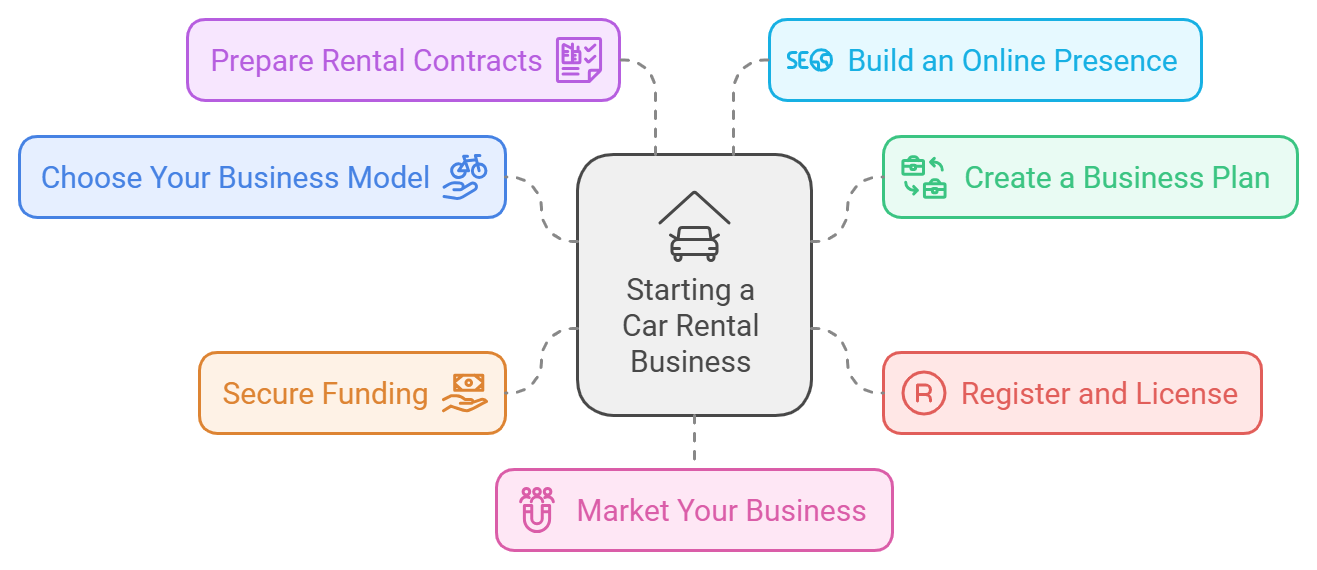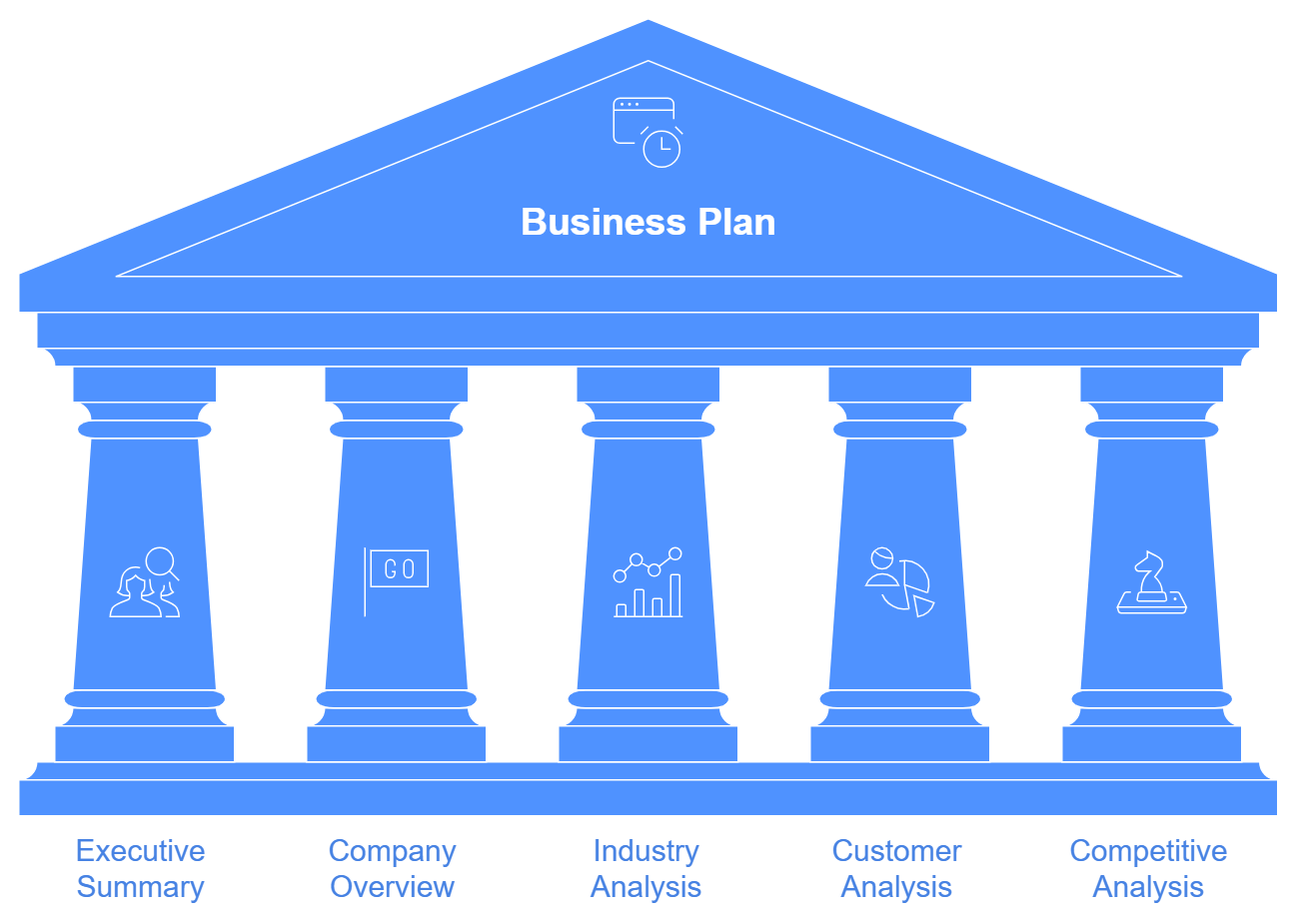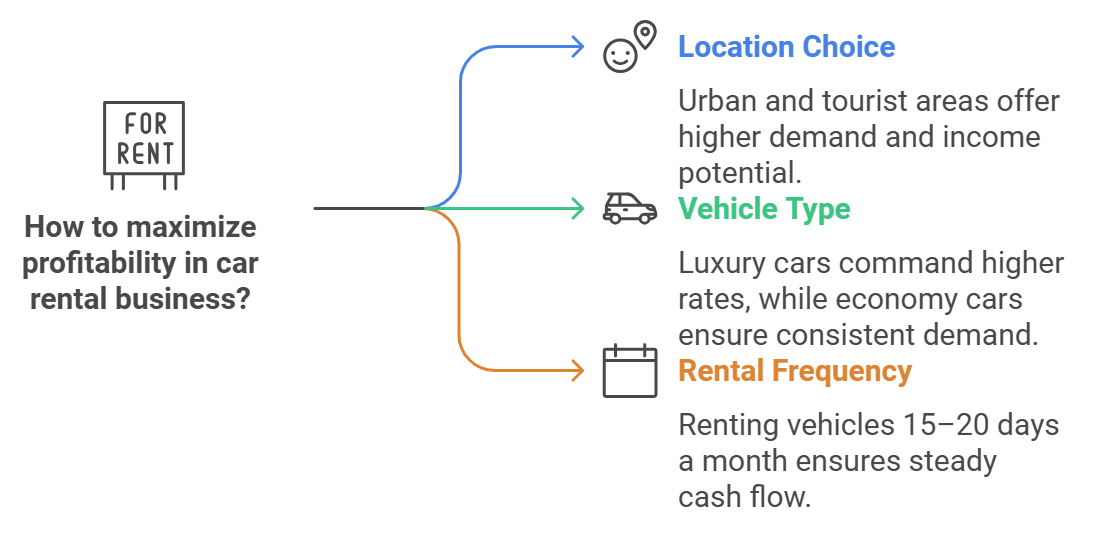Starting a car rental business can be a lucrative venture. With the industry expected to grow to $144.21 billion globally by 2027, this is an excellent time to invest in this sector. Here’s a clear and practical guide to help you start your own car rental business and navigate each crucial step effectively.

1. Choose Your Business Model
First, decide the type of car rental business that suits your goals and resources:
Franchise: Operate under an established brand’s name and guidelines. This provides a ready-made system but limits your independence.
Start-Up: Build everything from the ground up, including your brand, pricing, and marketing. This model offers complete control but requires significant effort and resources.
Online Car Rental Business: Use an online platform to manage all aspects of customer interaction, from car selection to payment. Cars are picked up and returned at a central location, streamlining the process for both you and your customers.
2. Create a Business Plan

To create a business plan for your car rental business, focus on these key elements:
- Executive Summary: Provide a concise overview of your business, including its name, location, and the type of rental services you plan to offer (e.g., standard, luxury, or exotic cars).
- Company Overview: Highlight the business’s goals, mission, and unique selling points. Specify if you’re starting independently or as part of a franchise.
- Industry Analysis: Research and document market trends, the size of the car rental industry, and key factors influencing it, such as travel trends or demand for specific types of vehicles.
- Customer Analysis: Identify your target customers, their demographics, and preferences. For instance, detail whether you’re targeting tourists, corporate clients, or local residents.
- Competitive Analysis: Analyze direct and indirect competitors. Identify what sets your business apart and how you’ll gain a competitive advantage.
- Marketing Plan: Outline your approach to the 4Ps:
- Product: Types of cars or services offered.
- Price: Competitive pricing structure.
- Place: Location selection and its strategic advantages.
- Promotions: Strategies like online ads, social media, and partnerships with local businesses.
- Operations Plan: Detail daily operations, necessary equipment, software (e.g., for bookings and inventory), and staffing needs. Include milestones for growth and expansion.
- Management Team: Introduce key members of your team and their roles in the business.
- Financial Plan: Provide a financial overview, including startup costs, revenue projections, and potential funding sources. Discuss profitability timelines and anticipated expenses.
3. Register and License Your Business
Ensure your business complies with all legal requirements:
- Business Entity: Choose between LLC, corporation, or sole proprietorship.
- Permits and Licenses: Requirements vary by location, so check local regulations.
- Insurance Coverage: Cover vehicles and liabilities to protect your assets.
Register your business through local authorities, and consider consulting a legal professional to streamline the process.
4. Secure Funding
Car rental businesses involve high upfront costs. Common expenses include purchasing vehicles, leasing space, and hiring staff. Explore these funding options:
- Business Loans: Term loans, lines of credit, or equipment financing for cars and office equipment.
- Personal Investment: Use savings or seek investors for initial costs.
Open a business bank account and credit card to manage transactions effectively.
5. Prepare Rental Contracts
A clear rental agreement protects your business and ensures a smooth customer experience. Include:
- Customer responsibilities for the vehicle (e.g., fuel, maintenance).
- Liability clauses for accidents and damages.
- Rental terms, including fees for late returns or special requests.
Have a legal expert review your contract to ensure all bases are covered.
6. Build an Online Presence
An online presence is vital for visibility and convenience. Key steps:
- Create a Website: Include features like online booking, fleet inventory, and pricing information.
- Leverage Social Media: Engage with potential customers on platforms like Instagram and Facebook.
- Use SEO and Ads: Optimize for search engines and consider paid advertising to drive traffic.
Consider integrating car rental management software for seamless booking, inventory tracking, and payment processing.
7. Market Your Business
Marketing is essential to attract and retain customers. Strategies include:
- Digital Marketing: Use SEO, email campaigns, and PPC ads to reach your target audience.
- Loyalty Programs: Offer discounts or special perks for repeat customers.
- Local Campaigns: Collaborate with travel agencies, hotels, or event organizers to boost visibility.
Is a Private Car Rental Business Profitable?
Starting a private car rental business can be a lucrative opportunity in today’s economy, driven by increased demand for short-term vehicle rentals. With the global car rental market projected to surpass $125 billion by 2027, there’s plenty of room for entrepreneurs to thrive.

Key profitability factors include:
Location: Urban areas and tourist hotspots tend to offer higher rental demand and better income potential.
Vehicle Type: Luxury cars often command higher rates, while economy cars generate consistent demand at lower prices.
Rental Frequency: Keeping vehicles rented 15–20 days a month ensures steady cash flow. For instance, renting an economy car at $60/day for 20 days can yield $1,200 monthly.
Profit margins typically range between 20% and 40%, even after accounting for expenses like insurance, maintenance, and platform fees. With thoughtful planning and strategic marketing, private car rental businesses can generate consistent and substantial profits.
Bottom Line
Starting a car rental business requires careful planning, strategic investments, and a focus on customer satisfaction. By following these steps, you’ll set yourself up for success in a growing and profitable industry.
Starting a car rental business does not have to be complicated. With FleetFinesse Car Rental Software, you can simplify every aspect of your operations, from managing reservations and payments to fleet maintenance and reporting, all in one place.
Take advantage of advanced AI tools, seamless website integration, and customizable customer portals to create an effortless experience for you and your clients. Whether you are just starting or growing your business, FleetFinesse provides the tools to keep you ahead of the competition.
Start building your car rental business today. Try FleetFinesse for free for 7 days. It is available on the App Store and Google Play.Get started now. The setup takes just 15 minutes!
